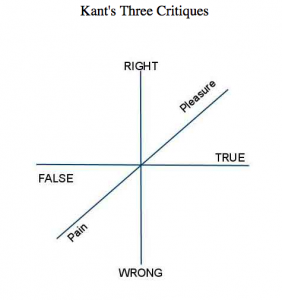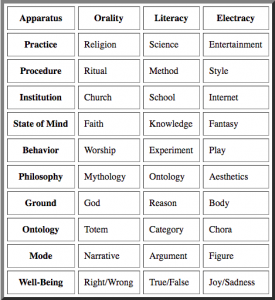MYSTORY 4
4) Anecdote Form (based on Labov)
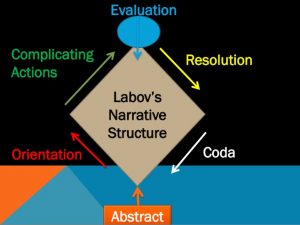
The linguist William Labov analyzed the parts of the anecdote 1) Abstract 2) Orientation 3) Complicating Action & Resolution 4) Evaluation 5) Resolution & Coda
|
The Birthday Surprise
[Abstract] Let me tell you about the day George, the hired man at the Gravel plant, surprised Walt with a birthday present. [Orientation] There was this huge pile, a mountain, of oversize rock that came off the side of the washer. Too big for anything, unless we had a crusher, which we could not afford. They just sat there, smooth oval mottled gray stone, and piled up over the years, always with a few rock-hounds climbing over it, lookng for agates. You could get a full cubic yard, over a ton of this rock, for two dollars in those days. [Complicating Action] One day George came back from lunch with a present for Dad, a birthday present, something he found at the drugstore. Walt opened it and there was this box and inside the box was a pet rock. [Evaluation] The pet-rock fad was just starting. Now there was no difference between this pet rock and the rocks in the ovesize pile, except that the pet one had a face painted on it, a frown, with knitted eyebrows, like it was angry, and it was packaged in this box like a pet carrier. [Action continued] George says, “guess what this thing cost?” and Dad said he couldn’t guess. “Two bits?” he says. “Two dollars!” says George. [Evaluation: intensifier] Two dollars each he says. [Action…] Dad stared at that rock, hefted it in his hand, and this look came over his face. [Evaluation] I thought he was going to throw it. [Resolution] And that look was a good imitation of the frown on his new pet. [Coda] He turned to me and says, “Go put this on the oversize pile.” (275 words) |

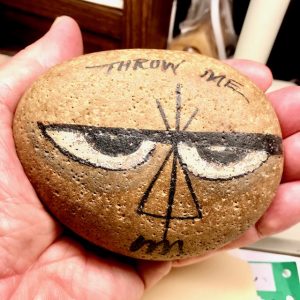
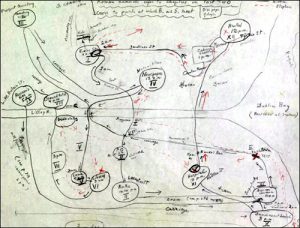 History (School, Community): Young Joyce’s imagination was captured by the cause of Irish freedom, whose most prominent spokesman at the time was Charles Stewart Parnell, a national hero who suffered a tragic fall. “He was accused of adultery in the divorce suit of Captain O’Shea. At first it appeared that Parnell might weather this scandal, but a coalition of political enemies and devout Catholics ousted him from leadership of the Irish Parliamentary Party, and the rural population of Ireland turned against their hero with savage hatred” (Litz, 1972: 20). At Parnell’s funeral crowds tore to shreds the case in which the man’s coffin had been shipped in order to have a relic. Soon he became in the Irish imagination the type of the betrayed hero (21).
History (School, Community): Young Joyce’s imagination was captured by the cause of Irish freedom, whose most prominent spokesman at the time was Charles Stewart Parnell, a national hero who suffered a tragic fall. “He was accused of adultery in the divorce suit of Captain O’Shea. At first it appeared that Parnell might weather this scandal, but a coalition of political enemies and devout Catholics ousted him from leadership of the Irish Parliamentary Party, and the rural population of Ireland turned against their hero with savage hatred” (Litz, 1972: 20). At Parnell’s funeral crowds tore to shreds the case in which the man’s coffin had been shipped in order to have a relic. Soon he became in the Irish imagination the type of the betrayed hero (21).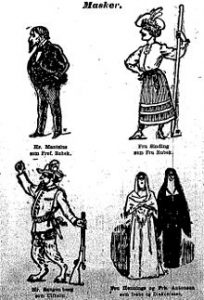 Career: At age eighteen Joyce published a refiew of Ibsen’s play, “When We Dead Awaken” in The Fortnightly Review. In a letter he sent to Ibsen, the student Joyce explained that while he promoted the dramatist’s work at every opportunity, he kept to himself the most important reasons for his admiration. “I did not say how what I could discern dimly of your life was my pride to see, how your battles inspired me–not the obvious material battle but those that were fought and won behind your forehead–how your willful resolution to wrest the secret from life gave me heart and how in your absolute indifference to public canons of art friends and shibboleths you walked in the light of your inward heroism” (Joyce, in Litz, 24).
Career: At age eighteen Joyce published a refiew of Ibsen’s play, “When We Dead Awaken” in The Fortnightly Review. In a letter he sent to Ibsen, the student Joyce explained that while he promoted the dramatist’s work at every opportunity, he kept to himself the most important reasons for his admiration. “I did not say how what I could discern dimly of your life was my pride to see, how your battles inspired me–not the obvious material battle but those that were fought and won behind your forehead–how your willful resolution to wrest the secret from life gave me heart and how in your absolute indifference to public canons of art friends and shibboleths you walked in the light of your inward heroism” (Joyce, in Litz, 24).